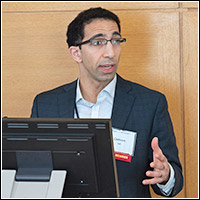News
Welcoming New Senior Fellows to the Leonard Davis Institute
Report from the 2019 Annual LDI Fall Kickoff Event


Presenting at the LDI 2019 Fall Kickoff in the Wharton School’s Huntsman Hall is new LDI Senior Fellow and Wharton School Assistant Professor of Management, Stephanie Creary, PhD.
Each September for the last seven years, the Leonard Davis Institute of Health Economics (LDI) has convened a “Fall Kickoff” event to welcome its latest round of new Senior Fellows from across the University of Pennsylvania campus. This year’s inductees are from the Perelman School, the Wharton School, the School of Nursing and Children’s Hospital of Philadelphia (CHOP). Their disciplines range widely from emergency medicine and health care management, to pediatrics, geriatrics, epidemiology and more. Each was allotted four minutes for a speed-dating-like presentation about themselves, their work and their collaborative interests. In her welcome, LDI’s new Director of Engagement Alison Buttenheim, PhD, MBA, emphasized that the gathering typified how LDI provides opportunities for health services researchers to interconnect across the broad Penn community. A reception after the presentations enabled old and new Fellows to meet and chat about their mutual interests. These are the 18 new Senior Fellows who presented: (Click images for larger)
Erin Aakhus, MD, MSHP
Assistant Professor and Assistant Fellowship Program Director in the Division of Hematology-Oncology

Cancer Treatment Costs and Gender Equity
Erin Aakhus considers herself to be an Oncoeconoethicist. “I fancy myself a fusion of oncology, health economics and ethics research,” she told the gathering. “I’m interested in expanding our understanding of the financial impacts on individuals and the country of all the amazing new cancer medicines that are as wonderful as they are expensive. These costs have led to many patients discontinuing treatment early, not adhering, and experiencing bankruptcy. Early mortality associated with bankruptcies and physical pain and depression are exacerbated by the costs. This data has me interested in studying cost transparency.” Aakhus is also interested in gender equity in the health care professions and was part of a recent study documenting that when dealing with a paper written by male and female co-authors, high-impact academic journals more frequently list the male author first. | See bio page |
Rebecca Brown, MD, MPH
Assistant Professor of Medicine in the Division of Geriatrics

Improving Function in Older Adults in Vulnerable Populations
Rebecca Brown, who moved to Penn a year ago from the University of California, San Francisco, is pursuing a number of research projects aimed at improving function in older adults, particularly those who are members of vulnerable populations. “The ability to perform the basic activities of daily living (ADLs) — bathing, dressing, getting in and out of a chair — are so important because when people develop difficulties with ADLs they are unable to live independently,” said the geriatrician. “It’s one of the strongest predictors of health outcomes in older adults and puts them at dramatically higher risks for bad health outcomes. I’ve done a lot of work looking at function and health in older adults experiencing homelessness. As part of that right now, I’m working with colleagues to develop permanent sorts of homeless adult housing that are aging adaptive.” | See bio page |
Molly Candon, PhD
Research Assistant Professor at the Center for Mental Health in the Department of Psychiatry, and lecturer in the Wharton School Department of Health Care Management

From Moneyball to Autism and Chronic Pain Studies
Molly Candon began with the fun fact that she originally set out to become a sports economist, a goal heavily influenced by the work of sports statistician Bill James who helped devise the scientific analysis system made famous in the book and movie “Moneyball.” She spent three seasons working in the front office of the Boston Red Sox before going to the University of Georgia, where she hoped to study college football. “Until,” she said, “I came to realize that no one wanted to train a sports economist.” She switched to health economics, began studying autism, earned her PhD, and in 2016 was attracted to Penn by the autism research of LDI Senior Fellow David Mandell and the encouragement of LDI Senior Fellow and Wharton Health Care Management Professor Guy David. Now a faculty member of the Penn Center for Mental Health, Candon is involved in health services research studies of various aspects of autism and chronic pain management. | See bio page |
Jeremy Cannon, MD, SM, FACS
Associate Professor of Surgery

Researching Military and Civilian Health Issues
Jeremy Cannon is a nine-year veteran of the U.S. Air Force who served as a trauma surgeon in Iraq in 2007. He cites that experience as a major influence on his current work in trauma surgery and critical care at Penn. Currently a Colonel in the Air Force Reserves, he is assigned to the office of Health Affairs in the Pentagon. “I’m interested in looking for synergy between military and civilian care, not just in trauma but in other areas,” he explained. “The field is wide open and the DOD is very receptive to hearing what has worked in civilian care, how we can maintain our focus in military care, and what we can learn from our civilian colleagues.” Cannon will be the guest editor for next year’s military supplement in the journal Trauma. He invited submissions from LDI Senior and Associate Fellows. His fun facts were that he and his dog often go on long runs and that he and his family are avid skiers. | See bio page |
Stephanie Creary, PhD
Assistant Professor of Management at the Wharton School

The ‘Life Preserver’ Moments of Professional Identity
Before getting her PhD degree, Wharton School Assistant Professor of Management in the Organizational Behavior Group Stephanie Creary spent 16 years as a speech-language pathologist specializing in neurological and cognitive disorders. “It’s actually through my experience working in health care that I became interested in this topic of identity not only as someone who identifies as a black woman working in health care but also somebody who has witnessed first hand the multitude of issues around professional identify that can exacerbate some of the other challenges we have in health care settings,” she said. Clicking to a screen image of a woman leaping across water in a life preserver, she noted her research “is fundamentally interested in finding those ‘life preserver’ moments where we can adapt tools and strategies to more effectively building bridges across our differences.” | See bio page |
Timothy Gaulton, MD, MSCE
Assistant Professor in the Department of Anesthesiology and Critical Care, Perelman

Anesthesia and Post-Surgery Effects on Safe Driving Behavior
Timothy Gaulton’s current research work is focused on understanding how anesthesia and surgery come together to impact different health outcomes in ways not previously noticed. He is studying the effects on function and cognition in the area of safe driving behavior. The goal is to quantify the risk of car accidents and traffic citations using databases that link hospital encounters with injury statistics. One of his other recent research projects studied how preoperative cognitive impairment increases the risk of adverse events after outpatient surgical procedures. Another explored how obesity alters the risk of postoperative complications such as functional decline using longitudinal social and disability data. Gaulton joined the Perelman School of Medicine faculty last year. He completed his anesthesiology residency at the Brigham and Women’s Hospital and is a former Fellow in Critical Care Medicine at Penn. | See bio page |
Veena Graff, MD, MS
Assistant Professor in the Department of Anesthesiology and Critical Care, Perelman

Substituting Music for Sedatives in Pre-Surgical Anxiety Therapy
Penn Medicine faculty member Veena Graff made world news in July with the publication in the BMJ journal of her study that found certain kinds of music are as effective in calming pre-surgical anxiety as sedative drugs. The work was featured in a major article by BBC World News and a large number of other international media outlets. Focused on that period of time when patients were being injected with an anesthetic to dull feeling in a region of their body, the Graff’s study compared the sedative midazolam to the playing in noise-cancelling headphones of the song Weightless by the British band Marconi Union. “My entire research focuses on the patient experience,” said Graff, who is also a classically trained pianist, violinist and clarinetist. “One of the biggest things I look at is the benefits of music in the perioperative period and how we can reduce medication consumption during that whole experience.” | See bio page |
Joanna Lee Hart, MD, MSHP
Assistant Professor of Medicine at the Perelman School of Medicine

Why Preference-Sensitive Decision Making Fails End-of-Life Patients
A core faculty member of Penn Medicine’s Palliative and Advanced Illness Research Center (PAIR), Joanne Lee Hart has been engaged for ten years in research seeking to bring end-of-life care and decision making into line with patients’ real preferences. “We’re trying to to figure out the mechanisms of why the preference-sensitive decision process so often fails them,” she said. “My research is largely focused on two areas related to that. The first is on how people think forward about their health and the second is about the role clinicians play in preference-sensitive care.” Another arm of Hart’s research is focused on smoking-associated lung diseases and how the demographics of smoking and its related ailments continue to change. “White people aren’t smoking much any more,” she said. “So, any study of COPD is inevitably a study of health disparities related to the concentration of tobacco use in vulnerable populations.”. | See bio page |
Karen Hirschman, PhD, MSW, FGSA
NewCourtland Term Chair in Health Transition Research and Research Associate Professor in Penn’s School of Nursing

Nursing’s Transitional Care Model for Cognitively Impaired Elders
A fun fact for Karen Hirschman is that she is the only social worker on the faculty of the Penn School of Nursing. Much of her research is performed as a member of the team of interdisciplinary researchers working on the NewCourtland Center for Transitions and Health model of care. Led by Mary Naylor, PhD, RN, FAAN, the transitional care system is a nurse-led model that transitions older adults from the hospital to home. “I was brought onto this because of my training in degenerative disease,” said Hirschman. “They were just starting to test this model on cognitive impairment patients with whom it hadn’t been tested before. Historically, a lot of evidence-based interventions like this often exclude older adults with cognitive impairment because these are interventions when patients have to participate. But in this case, we were able to expand the model to patients and their caregivers and show that it worked just as well in those settings.” | See bio page |
Krzysztof (Kris) Laudanski, MD, PhD
Assistant Professor in the Department of Anesthesiology and Critical Care

Medical Decision Making: Primary Determinant of Patient Recovery
In a fun fact scientific presentation that sparked waves of laughter, Krzysztof Laudanski showed the results of his research on how many Americans can pronounce his first name correctly (almost none). On the serious side, Laudanski’s research focuses on the three distinctive areas: regulation of DNA expression in survivors after critical care illnesses, health care operations/medical decision-making processes, and medical volunteerism. On the first subject, he is a principal investigator on an NIH-funded project focusing on two things: the long-term regulation of gene expression after a critical care event, and the impact anesthesia and surgery have on the recovery of the patient of a critical care illness. His work also focuses on medical decision-making and health care operations as the primary determinant of patient recovery. | See bio page |
Terri Lipman, PhD, CRNP, FAAN
Assistant Dean for Community Engagement, Miriam Stirl Endowed Term Professor of Nutrition, Professor of Nursing of Children at Penn’s School of Nursing

Diabetic Children and Community Health Workers
Terri Lipman’s many years of working with diabetic children has been a tale of two different worlds finally defined by a recent study of the latest intervention designed to improve diabetes control. The research compared outcome achievement among children according to the kind of insurance they had — commercial or government. In the commercially insured group, hemoglobin A1C levels and overall diabetes control improved. Among government-insured children it did not. “We realized that intensive education programs and hospital-based interventions were not going to move the needle for patients impacted by social determinants of health,” said Lipman. In a new approach, her team is studying the addition of community health workers to the program. “It’s been humbling,” she said. “A patient I had seen every three months for ten years said the first community health worker visit was the best thing we had done in ten years.” | See bio page |
Meredith Matone, DrPH, MHS
Scientific Director of PolicyLab at the Children’s Hospital of Philadelphia (CHOP) Research Institute and a Research Assistant Professor of Pediatrics at Penn

The Power of Administrative Data Sets
“A big passion of mine is the use of administrative data for both program evaluation and health services research” said Meredith Matone, who spends a lot of time linking Medicaid data to vital statistics and other administrative data sets. “I think a lot about quasi experimental research design and how to leverage administrative data sets and links to help public systems better administer their programs with fidelity and effectiveness.” For several years, she has been working in partnership with the Pennsylvania Office of Child Development and Early Learning to evaluate post-implementation effectiveness of the state’s maternal and infant home visiting services. These involve visits by nurses or other paraprofessionals who provide parent coaching and community clinical connections for families. Matone’s research also focuses on infant mortality, maternal mental health and substance use, and intimate partner violence in the context of child abuse. | See bio page |
Stephanie Mayne, PhD, MHS
Assistant Professor of Pediatrics at the Children’s Hospital of Philadelphia (CHOP) and the University of Pennsylvania and a faculty member at PolicyLab and the Center for Pediatric Clinical Effectiveness at CHOP

Childhood Well-Being and CHOP’s ‘Possibilities Project’
Along with being part of Policy Lab and the Center for Pediatric Clinical Effectiveness, Stephanie Mayne is part of the Possibilities Project at CHOP — an innovation center working to reimagine pediatric primary care. “One of our Possibility Project projects is identifying parents’ and primary care providers’ priorities for wellness in early childhood. The goal is determining which of those wellness factors the parents are most interested in discussing with their pediatrician,” Mayne said. “We also have a study looking at the role of the neighborhood social environment and diet quality for low-income families. We’re also exploring how adolescent children’s neighborhood physical and social environments influence their sleep duration and quality. We’re using national survey data to understand the extent to which unhealthy lifestyle behaviors cluster together in children, and the socio-demographic causes for that.” | See bio page |
Ingrid Nembhard, PhD, MS
Fishman Family President’s Distinguished Associate Professor of Health Care Management at the Wharton School

Leader Behavior and the Health Care Work Environment
Wharton Associate Professor of Health Care Management Ingrid Nembhard’s fun fact was that she had no idea what health services research was during her college years as she majored in Ethics, Politics and Economics, and Psychology. And then, right out of school, she landed a job in a health insurance company “and discovered that health care brought together all these issues!” Since then, Nembhard has been studying the organizational side of health care delivery and how it affects the quality of care. “One of the things I’ve been particularly interested in throughout my career is the idea that in many work environments people don’t feel particularly safe to offer questions or suggestions,” she said. “That has a lot of implications for workers, patients and organizational outcomes. One of the things we found in health care is that leader behavior can really make a difference in the way people experience the work climate.” | See bio page |
Comron Saifi, MD
Assistant Professor of Orthopedic Surgery at the University of Pennsylvania

The Quest to Use AI in Spine Surgery Risk Predictions
Orthopedic spine surgeon Comron Saifi does complicated ten-hour surgeries to realign spinal deformities and, like his colleagues, is often frustrated by the lack of an accurate way to predict a patient’s complication risk. “The issue is there are some surgical risk calculators which I’ve used but, to be frank, they’re not really accurate,” he said. “My research is focused around trying to figure out how much risk each patient has for complications pre-operatively, and also what their function might be post-operatively. I’m working with a data analytics company to take the data from our patients at Penn and use artificial intelligence for the predictions of readmission and function for these patients. We’re putting the data into a Redcap database, then trying to use AI and our analytics team to crunch the numbers to figure out how an intervention could change a patient’s function or complication rate over time. | See bio page |
Sarah Schrauben, MD, MSCE
Instructor of Medicine in the Renal-Electrolyte and Hypertension Division, and Faculty Fellow in the Center for Clinical Epidemiology and Biostatistics at Penn

Increasing Chronic Kidney Disease Patients’ Healthy Behavior Adherence
Chronic kidney disease (CKD) researcher Sarah Schrauben said her fun fact was that “I found myself in support of one of President Trump’s executive orders this summer on the advancement of kidney health.” That order called for the increase in education and preventive care related to the condition that now afflicts 37 million Americans. “Unfortunately,” Schrauben said, “there are only seven clinical practice guideline recommendations aimed at halting kidney disease progression or limiting its complications. And of those seven, six almost completely rely on patients engaging in healthy behaviors; but, not surprisingly, less then 25% of CKD patients actually do.” Her current research is aimed at expanding the body of evidence related to the facilitators and barriers to recommendation adherence then using that data to develop a mobile health intervention to help increase adherence. | See bio page |
Paul Stricker, MD
Associate Professor of Anesthesiology and Critical Care at Perelman and Pediatric Anesthesiologist at the Children’s Hospital of Philadelphia (CHOP)

Mountain Unicycling and Pedi-INQUIRE Research Team
In his spare time, pediatric anesthesiologist Paul Stricker is a mountain unicyclist; he rides the rugged trails on a one-wheeled cycle for more than 1,000 hours each year and has done so in 18 countries on five continents. Back at the Children’s Hospital of Philadelphia, he heads the Pedi-INQUIRE group of researchers studying clinical outcomes in children with scientific and improvement methodologies aimed at developing diagnostic and therapeutic interventions to improve care. “I think as the Leonard Davis Institute of Health Economics exemplifies, when you have big, important questions, it helps to have a diverse group of individuals sitting around a table to achieve your goals. We have data scientists in our group, quality improvement experts, biostatisticians, clinical trialists, informatics scientists and others,” he said. | See bio page |
Benjamin Sun, MD, MPP
Professor and Chair of the Department of Emergency Medicine at the Perelman School of Medicine

Chest Pains in the ED: Needle in a Haystack Diagnoses
Looking back on his personal history, Benjamin Sun noted that among the most influential experiences of his career to date was his work in Kaiser-Permanente, the VA, university hospitals, community fee-for-service in nice neighborhoods and community fee-for-service in not-so-nice neighborhoods. “It was incredibly informative to be a front-line provider in all those different environments,” he said. In a current project he characterized as the “holy grail of emergency department medicine,” he is part of a team researching the diagnoses of ED patients with chest pains. “It’s looking for a needle in a haystack,” he said. “Maybe three out of a hundred patients will have a heart attack or pulmonary embolism or something scary. After 40 years of research, we really still have no idea what we’re doing.” The collaboration with Kaiser-Permanente has a prospective cohort of over a hundred thousand patients getting evaluated for chest pains. | See bio page |







